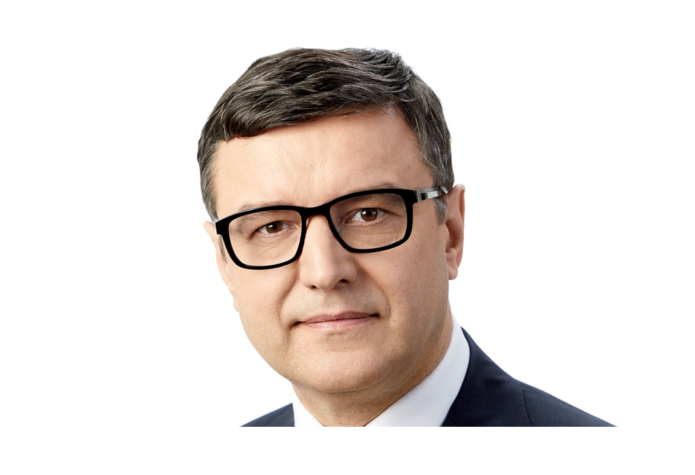Latvian Minister of Finance: NIB’s participation is a stamp of quality

“We still have much to do in making our country’s economy more resilient and sustainable from a growth perspective, and I see NIB’s productivity mandate as a useful tool for interacting with our entrepreneurs and banking sector”, says Jānis Reirs, Latvia’s Minister of Finance, who chaired the annual meeting of NIB’s Board of Governors in 2019.
NIB Newsletter asked Mr Reirs to comment on the Bank’s annual results for 2018 and the proposed changes to its statutes.
How would you characterise NIB’s performance in 2018?
The fundamental backdrop remained healthy in 2018 with certain challenges and volatility periods. The investment climate in member countries was favourable and the bank has shown strong financial results for 2018. I see NIB being in a good position to meet the challenges of the future. NIB has been able to retain its relevance as a long-term lender in its member countries. The Bank’s growth during the last three years has surpassed average GDP growth; however, it varied significantly within the Nordic-Baltic region.
At this meeting, the Board of Governors decided on changes to NIB’s statutes (read more here). These changes are subject to parliamentary approval, but why are they needed and what is the impact on the Bank?
Financial markets and governance practices are not constant matters. Development in these areas makes us adopt to changes, while at the same time keeping sound banking principles in place. The changes to the NIB statutes represent implementation of an improved management framework. Modernization of the statutes will further strengthen NIB to be more relevant in its activities and thereby add more value to all stakeholders. NIB will also become more effective in achieving its mandate and allow more efficient use of capital while, supporting the highest possible AAA/Aaa credit rating of the Bank.
Unlike other IFIs, NIB pays dividends to its owners, a total of EUR 40 million this year. How important is this?
Last year NIB recorded the highest lending volumes in its history. NIB is required to make profit from its operations in order to provide for the accumulation of reserves and a reasonable return on its paid-in capital. However, NIB is not a profit maximizing institution. Based on its business plan and profitability projections, NIB capital accumulation has an efficiency element to it. The primary objective of NIB is to provide financing for good investment projects carried out in its member countries. Dividends are the rewards resulting from partnership and joint efforts.
How do you see the role of IFIs such as NIB and the financial sector as a whole when tackling global challenges such as climate change?
Sustainable financing and climate responsible business is evolving. NIB has been a frontrunner in sustainable finance for a long time in the region and has financed a substantial number of projects with environmental benefits including certified sustainable and energy-efficient buildings and transport infrastructure. All activities to implement the NIB environmental mandate are highly important also for a “green” country such as Latvia. I do believe that NIB will enhance its efforts to finance bankable projects in the environmental sphere.
How do you see NIB’s added value compared with other international financial institutions where Latvia is an owner?
Every international financial institution is unique. NIB’s purpose is to contribute to the prosperity and sustainability of the Nordic–Baltic region in particular, which includes Latvia, by providing long-term loans to entrepreneurs. NIB continued its growth with high impact in its member countries, under both the productivity and environmental mandate. For us, NIB participation in projects is a stamp of quality.
Latvia joined the NIB along with its Baltic neighbours in 2005. After almost 15 years, how has the experience been?
Beginning in 2005, we have successfully made the transition to a market economy, and NIB has been instrumental in this transition. We still have much to do to in making the country’s economy more resilient and sustainable from a growth perspective, and I see the NIB productivity mandate as a useful tool for interacting with our entrepreneurs and banking sector. NIB has funded many important projects in the Baltics, thereby helping to successfully develop both business and infrastructure projects.
How do you see the economic outlook for the region and in particular for Latvia? What are the biggest opportunities and challenges for the Latvian economy in the coming years?
In the last two years, we have seen a significant acceleration in Latvia’s GDP growth. Growth reached 4.6% in 2017 and rapid economic activity remained in 2018, when GDP increased by 4.8%, driven by both strong growth in investment volumes and still fast growing private consumption. For the next few years, we expect weaker growth as the global economy is facing a slowdown. The inflow of EU funds will be more moderate in the coming years, albeit still strong. Growth in private consumption will be sustained, supported by a relatively rapid rise in wages.
In terms of opportunities, I believe that the new form of financing “equity participation”, as provided in the amended statutes of the Bank, will provide additional impetus for businesses in Latvia as well.
As the Chair of the NIB’s Board of Governors, what do you have on your wish list for the Bank?
I wish that NIB continues to have its strong standing in international financial markets, supported by the strength of its member countries, thus maintain its ongoing business focus on opportunities related to the integration of its member countries.